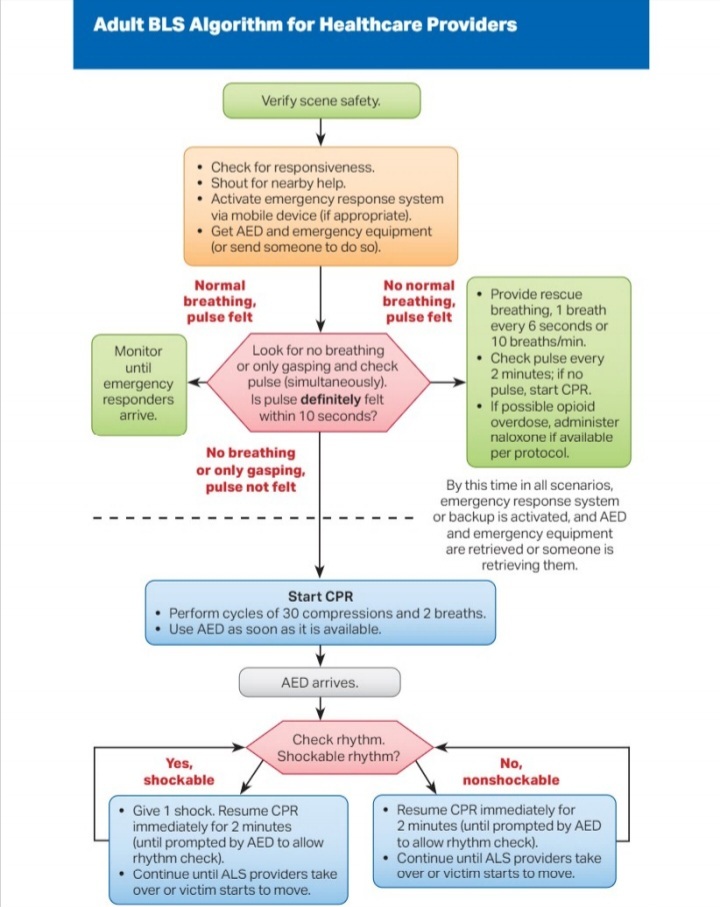(Images can be enlarged if needed)

Cardiac arrest, also known as Sudden Cardiac Arrest, is when the heart stops beating suddenly. The lack of blood flow to the brain and other organs can cause a person to lose consciousness, become disabled or die if not treated immediately.
The terms ‘heart attack’ and ‘cardiac arrest’ are often used interchangeably, but these are two different heart conditions.
A heart attack occurs when there is a blockage in the arteries that stops blood flow in the heart. Due to the lack of blood and oxygen flowing in the heart, the heart muscle tissue will become damaged. Heart attacks can increase the risk for cardiac arrest because heart attacks can alter electrical signals in the heart.
CPR – or Cardiopulmonary Resuscitation – is an emergency lifesaving procedure performed when the heart stops beating. Immediate CPR can double or triple chances of survival after cardiac arrest.
If someone experiences cardiac arrest, they need immediate treatment to increase the flow of oxygen-rich blood to their organs. CPR is the compression over the chest to manually pump a patients heart. Rescue breaths are preformed to provide oxygen to the body.
During CPR, proper hand placement on the lower half of the sternum is crucial. Placing hands over the sternum ensures effective chest compressions directly above the heart, optimizing blood circulation throughout the body.
According to the American Heart Association (AHA), the overall survival rate for out-of-hospital cardiac arrest is around 10%. However, survival rates can be improved if bystander CPR is started immediately. Studies have shown that bystander CPR increases the chances of survival for someone experiencing cardiac arrest. In fact, the AHA reports that survival rates increases to 40% or higher when bystander CPR is performed promptly. The surival rate is between 24% and 40% for those that happen in the hospital, according to the report published online in the Emergency Medicine Journal.
CPR is preformed between 100 - 120 beats per minute. Famously Staying Alive by the Bee Gees is the same beat. A large list of songs with the correct BPM can be found here
![]() The American Red Cross gives the following list of steps to asses if CPR is needed and how to preform:
The American Red Cross gives the following list of steps to asses if CPR is needed and how to preform:
1 CHECK the scene for safety, form an initial impression and use personal protective equipment (PPE)
2 If the person appears unresponsive, CHECK for responsiveness, breathing, life-threatening bleeding or other life-threatening conditions using shout-tap-shout
3 If the person does not respond and is not breathing or only gasping, CALL 9-1-1 and get equipment, or tell someone to do so
4 Kneel beside the person. Place the person on their back on a firm, flat surface
5 The American Red Cross CPR guidelines recommend 100 to 120 chest compressions per minute, 30 at a time. Remember these five points:
Hand position: Two hands centered on the chest
Body position: Shoulders directly over hands; elbows locked
Compression depth: At least 2 inches
Rate of compressions: 100 to 120 per minute
Allow chest to return to normal position after each compression
6
Give 2 breaths
Open the airway to a past-neutral position using the head-tilt/chin-lift technique Pinch the nose shut, take a normal breath, and make complete seal over the person’s mouth with your mouth. Ensure each breath lasts about 1 second and makes the chest rise; allow air to exit before giving the next breath Note: If the 1st breath does not cause the chest to rise, retilt the head and ensure a proper seal before giving the 2nd breath If the 2nd breath does not make the chest rise, an object may be blocking the airway
7 Continue giving sets of 30 chest compressions and 2 breaths. Use an AED as soon as one is available! Minimize interruptions to chest compressions to less than 10 seconds.
Sources:
https://www.hopkinsmedicine.org/health/conditions-and-diseases/cardiac-arrest
https://cpr.heart.org/en/resources/cpr-facts-and-stats
https://www.mycprcertificationonline.com/blog/cpr-success-rate
Instructional images from the AHS Basic Life Support Manual (2020)
Join our public Matrix server! https://matrix.to/#/#tracha:chapo.chat
As a reminder, be sure to properly give content warnings and put sensitive subjects behind proper spoiler tags. It's for the mental health of not just your comrades, but yourself as well.
Here is a screenshot of where to find the spoiler button.



Idk. I've been a low maintenance friend in the past. I keep a lot to myself, and I guess to me, I feel like me speaking up is the sign that things are bad. Me going a long time without reaching out is the sign that things are bad. I don't think any of my friends in school saw it that way, frankly
If I mention a thing that I am going through, I am mentioning it because I want help and another perspective. A lot of people will just stand and stare, and I'm worried that I literally have to say "can you help me fix my brain" or "can you help me want to live" because I don't entirely know in practical terms what to ask for from an individual in the context of my mental health.
When someone makes it seem like remembering to text you is an inconvenience, you stop wanting to put that effort in. I don't know how to undo that, I want to put my time and effort where it is valued.
Internal contradictions
It depends on what the issue mentioned is, but personally I usually make a judgement on whether it's a "listen and let them vent" type issue or a "oh I have practical advice that might help" type issue. I would never just stand and stare though, seems like poor form to me.
We're gonna beat up this type of person, but yeah relatable. Just gotta find people who value you and what you say, which y'know easier said than done.
Telling people didn't work, and hiding from the world has also not worked. Two strategies that did not work. I had it in my head that someone would eventually straight up ask "Pleakley, you're freaking out! What's wrong? Did something happen?"
And yeah, struggling with mental illnesses creates a ton of internal contradictions. If I knew exactly what the neurotypicals wanted to hear, I would deafen them.
My instinct is that you've been speaking with a rash of incredibly poor quality people, or at least ones who have no idea about mental health shit. I mean, I would never just not say something to someone. But no, often people will not ask, depends on the person though again.
Neurotypicals don't want to hear anything and we shall beat them with steel folding chairs.
It's possible. To some extent I have to accept that we're just on different pages. Different books.
There's a lot I don't share directly. If these people knew the extent of my depression and dysphoria, maybe they wouldn't have all left me alone. I thought I was sparing them my drama but now nobody even looks for me lmao
kinda of aside
I hesitate to give my opinions unless people ask because sometimes people want to vent. I usually focus on trying to get people talking when they're upset. Feels good when people are honest with me, I can usually tell something is not right, even over text. I've also still got some "please like me" brainworms that can make it a bit difficult for me to really offer up my thoughts without prompting (but when I do, I will be honest).
Everyone around me does this too - sometimes when I'm upset, I'm upset about 8 things at once, and I'm seeing the situation from every single angle simultaneously. My partner doesn't offer advice because he's sometimes not quite sure what the actual core problem is. I think it's fair, I try to ask him exactly what I want to know.
this sucks, for sure. i hope you can find some people for which you don't feel that way.